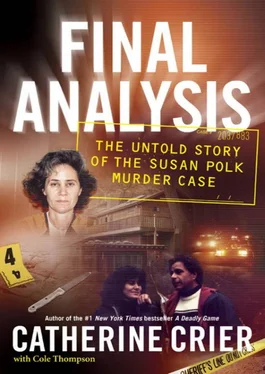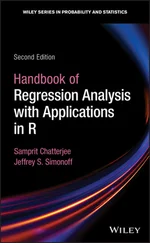Susan had spent much of her life trying to keep her anxiety and panic under control. She had managed to run a household, raise three boys, and take care of the family’s personal finances, yet throughout their marriage, Felix repeatedly threatened to play his trump card—to proclaim that she had a mental illness and have her locked up. It was never clear to Susan that she was sick, but she was unwilling to take the chance that such a diagnosis might be believed.
The Polks’ oldest son, Adam, who was currently a sophomore at the University of California in Los Angeles, had been in high school when the fighting began. To him, the solution was obvious—his parents were a mismatch and should separate. As far as he was concerned, the two fed off each other like children who both wanted to be right. Things were not as clear-cut for the couple’s middle child. Initially, Eli had inserted himself into the melee in hopes of mediating a settlement, but he soon found himself over his head, and the constant bickering began to take a toll on the teen. While his loyalties to each parent shifted constantly, Eli frequently found himself drawn into his parents’ routine altercations. During one fight, he’d intervened to defend his dad from what he perceived as unwarranted behavior by Susan. He became so angry that he hauled off and punched Susan in the face, leaving a scar on her lip that remains to this day. On that October night, he was at the Byron Boys’ Ranch, a juvenile, minimum security facility about thirty minutes away in the hills of the East Bay, where he was serving time for a parole violation.
The youngest son, Gabe, was ten years old when the craziness began. He was the most vulnerable of the three boys. Almost immediately, he aligned himself with his mother, probably because she was the parent most often at home. His dad worked long hours, and when he was around, he would read or spend time in his bedroom. Gabe agreed with his mother’s assessment that his father was a “monster” and not stable enough to care for Gabe and his brothers. Now Gabe stood 5′9″, with almond-shaped brown eyes and close-cropped dark hair. He was muscular, yet significantly leaner than his two older brothers.
When she first broached the topic of divorce four years earlier, Susan told Felix that she would strike a compromise with him: She would remain in the marriage until the boys reached eighteen. This was unacceptable to Felix, who protested that Susan was the center of the family, and without her, everything would fall apart. Nevertheless his words rang hollow because his behavior demonstrated that he saw himself at the center of it all, with everyone walking on eggshells around him. Soon after rejecting the compromise, Felix made his hypocrisy clear when he confided to his youngest son that he didn’t want the marriage to end, not only because he loved his wife, but more important, because he didn’t want to be alone in his golden years.
In truth, Susan loved him in her own way. He was her savior, a man who knew everything and whose word was law. For over twenty years, he had controlled her decisions, dictated her behavior, and micromanaged every aspect of her life. Though his actions were often overbearing, they seemed to be undertaken to help and potentially heal her. It was for this reason that he supported her education and funded her college degree, but despite this encouragement, he did not want her working outside the house once she received a diploma. Susan cared for the children, while cooking, cleaning, and managing the couple’s finances. Like his first wife, she even kept the books for Felix’s practice. After the couple wed in 1981, she also cared for Felix’s daughter, Jennifer, from his first marriage, while Jennifer’s mother completed her doctoral studies at Northwestern University.
By the time she was thirty-five, Susan had had enough. She wanted to go out into the world—to break free of his controlling grasp. She was tired of being told what to do and wanted to make her own decisions, to find her own friends. For too long her social world consisted primarily of Felix’s patients, relationships that most therapists would have avoided, yet Felix encouraged. In fact, Susan found it odd that Felix had no real friends, only patients and colleagues.
She was increasingly intolerant of his close friendship with a former patient. What had started out as twice-weekly counseling had morphed into an affair-like relationship, with the patient an invited guest to family birthdays and holidays at the Miner Road compound. It was not immediately clear why her husband had taken such a fancy to this woman; she was older than Susan and not particularly pretty. Nevertheless, she put Felix on a pedestal, Susan thought, even going so far as to enroll in courses at a local college to be a psychologist, just like her doctor.
In her new role as therapist, the woman joined Felix in deciding that Susan’s mother Helen was “crazy” and not fit to share in the family’s holiday festivities. That Felix’s former patient, also a tenant in one of the Polk’s Berkeley apartment complexes, was making decisions for the family angered Susan.
Then there were the gifts. Sheila was spending an inordinate amount of money on presents for Felix, with a pair of expensive gold cufflinks that cost upwards of $1,000 among the offerings. Unfortunately, these lavish gifts were not the most disturbing aspect of their relationship. A few years earlier, Susan had supposedly walked in on the two embracing in a way that was “not a hug” but a kiss that spoke volumes to Susan about the possible nature of their friendship.
But Felix’s former patient was not the topic of their pool house argument that October night.
Susan was enraged that Felix had slyly gained control of the Orinda property—and won temporary custody of their fifteen-year-old son, Gabriel—while she was out of state looking for a place to relocate. Also, he had succeeded in getting her monthly alimony payments reduced from $7,000 to $1,700, a sum too low to live on, and certainly not enough to afford the condo she had just put a deposit on in Bozeman, Montana. Additionally, Felix had filed papers several months earlier that demanded Susan get a job to help support her and Gabriel, although she hadn’t worked since 1979 when she did part-time bookkeeping for his burgeoning private practice.
Once inside the pool house that Sunday night, it wasn’t long before Susan and Felix were exchanging heated words once again. But this fight would end quite differently from the others.
Chapter Three
THE MORNING AFTER
On Monday October 14, Susan began her morning routine as if it were just another day. The forty-four-year-old mother possessed the rare ability to disguise troubling thoughts, a point reinforced by Gabriel’s later statements that she appeared calm and relaxed when she drove him to school in nearby Walnut Creek that morning. Like his mom, the teen had been ordered to attend a continuation school after he’d stopped attending the ninth grade at the public high school in Orinda.
After dropping him off at Del Oro High School, Susan claimed she went directly home and spent the remainder of the morning chasing down the family’s yellow Labrador, Dusty, who was loose in the neighborhood. In fact, she had the dog in the car with her when she returned to pick up Gabe at school around 12:30 that afternoon. The dog even joined them for lunch at Baja Fresh Mexican Grill in the neighboring town of Lafayette.
As far as Gabe was concerned, his mother was acting “perfectly normal” during their meal at the fast-food grill. They stopped at a local drugstore to buy some acne medication for his teenage complexion. It wasn’t until they returned home, and Susan promptly announced that she needed to run another errand, that the teen grew suspicious.
Читать дальше











